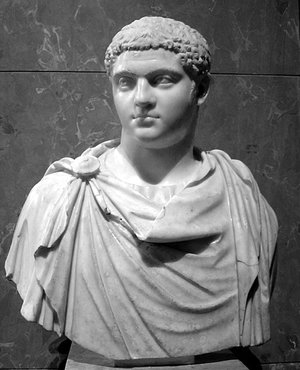Publius Septimius Geta
|
|
Publius Septimius Geta (March 7, 189–December 211), was a Roman Emperor co-ruling with his father Septimius Severus and his older brother Caracalla from 209 to his death.
He was the younger son of Septimius Severus by his second wife Julia Domna. Geta was born in Rome, at a time when his father was only a provincial governor at the service of emperor Commodus.
Geta was always in a place secondary to his older brother Lucius, the heir known as Caracalla. Perhaps due to this, the relations between the two were difficult from their early years. Conflicts were constant and often required the mediation of their mother. To appease his youngest son, Septimius Severus gave Geta the title of Caesar in 209. During the campaign against the Britons of the early 3rd century, the imperial propaganda publicized a happy family that shared the responsibilities of rule. Caracalla was his father's second in command, Julia Domna the trusted counsellor and Geta had administrative and bureaucratic duties. Truth was that the rivalry and antipathy between the brothers was far from being improved.
When Septimius Severus died in York in the beginning of 211, Caracalla and Geta were proclaimed joint emperors and returned to Rome.
Following Geta's assassination, Caracalla damned his memory and ordered his name to be removed from all inscriptions. The now sole emperor also took the opportunity to get rid of his political enemies, on the grounds of conspiracy with the deceased. Contemporary sources refer to numbers of about 20,000 persons of both sexes killed and/or proscribed during this time.
| Contents |
Mythical king of Britain
Geoffrey of Monmouth (a highly un-attendible source for Roman Britain history) claims that Geta was raised to the kingship of the Britons by the Roman legions still occupying York. The Britons, however, rose up Caracalla to the throne because Monmouth states Caracalla was the son of a Briton mother. This contradicts evidence that Geta and Caracalla had the same mother. Regardless, the shared throne was not a success: the brothers argued about every decision, from law to political appointments. Later sources speculate about the desire of the two of splitting the empire in two halves. By the end of the year, the situation was unbearable. Caracalla tried to murder Geta during the festival of Saturnalia without success. Later in December he arranged a meeting with his brother in his mother's apartments, and had him murdered in her arms by centurions.
External links
- Life of Geta (http://penelope.uchicago.edu/Thayer/E/Roman/Texts/Historia_Augusta/Geta*.html) (Historia Augusta at LacusCurtius: Latin text and English translation)
References
- Dio Cassius lxxvii; Herodian iv. I.
See also
| Preceded by: Septimius Severus | Roman Emperor 208–211 with Septimius Severus and Caracalla | Succeeded by: Caracalla (alone)
|

